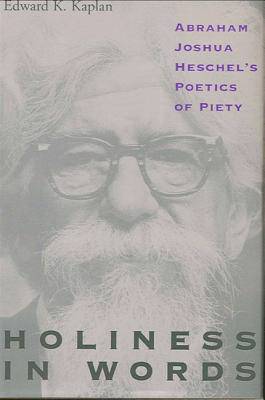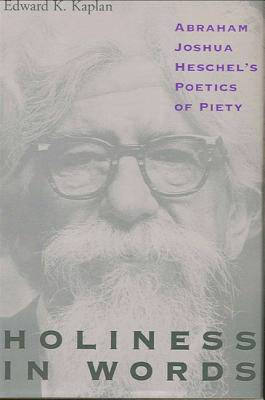
Door een staking bij bpost kan je online bestelling op dit moment iets langer onderweg zijn dan voorzien. Dringend iets nodig? Onze winkels ontvangen jou met open armen!
- Afhalen na 1 uur in een winkel met voorraad
- Gratis thuislevering in België vanaf € 30
- Ruim aanbod met 7 miljoen producten
Door een staking bij bpost kan je online bestelling op dit moment iets langer onderweg zijn dan voorzien. Dringend iets nodig? Onze winkels ontvangen jou met open armen!
- Afhalen na 1 uur in een winkel met voorraad
- Gratis thuislevering in België vanaf € 30
- Ruim aanbod met 7 miljoen producten
Zoeken
€ 151,45
+ 302 punten
Uitvoering
Omschrijving
Holiness in Words: Abraham Joshua Heschel's Poetics of Piety is both an introduction to reading Heschel's works in English, and an in-depth study of the way his literary style can transform the consciousness of readers. Heschel's life and works respond to the contemporary crisis in religion, formulating positions on faith and despair, racism and social justice, the Holocaust, interreligious dialogue, and the availability of God's presence. We study Heschel's theory and use of literary language, his "poetics of piety," in order to elucidate his narrative strategy to teach God-centered (or prophetic) thinking.
The book traces the major themes of his "depth theology," awe and radical amazement, the meaning of symbol, ritual, prayer, and mystical insight. Historical and biographical information clarifies Heschel's implicit polemic with Martin Buber and a supplemental study guide provides sources for each chapter and suggestions for further thought and discussion.
The book traces the major themes of his "depth theology," awe and radical amazement, the meaning of symbol, ritual, prayer, and mystical insight. Historical and biographical information clarifies Heschel's implicit polemic with Martin Buber and a supplemental study guide provides sources for each chapter and suggestions for further thought and discussion.
Specificaties
Betrokkenen
- Auteur(s):
- Uitgeverij:
Inhoud
- Aantal bladzijden:
- 213
- Taal:
- Engels
- Reeks:
Eigenschappen
- Productcode (EAN):
- 9780791428672
- Verschijningsdatum:
- 14/03/1996
- Uitvoering:
- Hardcover
- Formaat:
- Genaaid
- Afmetingen:
- 152 mm x 229 mm
- Gewicht:
- 226 g

Alleen bij Standaard Boekhandel
+ 302 punten op je klantenkaart van Standaard Boekhandel
Beoordelingen
We publiceren alleen reviews die voldoen aan de voorwaarden voor reviews. Bekijk onze voorwaarden voor reviews.











